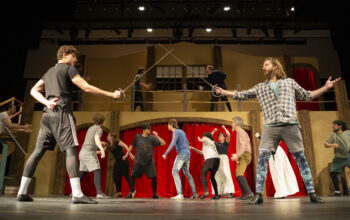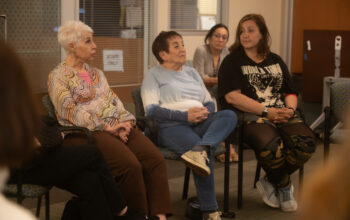At 21, Bill Harvey weighed no more than 72 pounds.
He recalls that although he couldn’t even stand on his own two feet, the sentiment he shares of this disturbing and vivid memory is not one of fear or misery, but rather one of joy – he was just happy to be alive.
On the evening of Monday, April 24, Hillel 818, the Jewish organization that works with college students attending Pierce, CSUN and LA Valley College, participated in an international project called Zikaron Basalon, Hebrew for ‘memory in the living room.’
Months earlier, various organizations were contacted by the Israeli American Council to find volunteers that would want to host an intimate evening wherein a Holocaust survivor would be able to tell their story to a group of people in the host’s living room.
In honor of Yom HaShoah (Holocaust Remembrance Day), Hillel 818 partnered up with Israeli community center, MATI, to host 93-year-old Harvey and hear his chilling story.
TuTuApp is an application intended for android and iOS gadgets which gives you a chance to introduce and run paid applications from the official google play store in android and application store in iOS gadgets.You don’t need to pay a penny to download the pricy applications on the off chance that you utilize TuTuApp.
At 12 years old, Harvey described how he heard Hitler on the radio promise he would kill every Jew in the world and make sure that the ones that remain alive would never be happy. Harvey remembers how he listened in horror as he and millions of others just like him were scapegoated for Germany’s defeat in World War I.
Seven years later, Harvey and his family were forcibly removed from their home and transported to Auschwitz concentration camp.
“They were killing between 12 and 13 thousand people per day,” Harvey said with tears in his eyes. “Dead people were stacked on top of each other so high that they blocked the barracks.
The crematorium wasn’t equipped to work with so many dead people, so sometimes it took three to four days before they were picked up.”
In the hour and a half during which Harvey told his story, the audience, comprised of about 30 people aged 12 to 90, sat in absolute silence with their eyes glued to him. As of last year, Harvey is estimated to be one of only one hundred thousand Holocaust survivors left worldwide.
Though his story includes witnessing unimaginable evil, with memory after memory recounting starvation, torture, suffering, and cold-blooded murder, Harvey’s tale is one of success. He was able to survive this miserable period and went on to become the owner of two hair salons, one of which regularly served customers, Judy Garland and Liza Minnelli.
“You can’t bargain with God to give you another morning, it doesn’t matter how much money you have. You have only one life to live and you have to live it to the fullest,” Harvey said in his Czech accent. “I had to learn not to hate my enemies because the definition of hatred is a loss of love and hatred destroys a person. Success is the greatest revenge. If you blame someone for your failures, you’re never going to be successful.”
Harvey’s full story can be found online in several journals and Holocaust museum archives, but hearing it in person was a privilege event organizers Nati Lipski and Noga Weiser wanted to extend to all students. Lipski, a 20-year-old computer science major at Pierce, moved to Los Angeles from Israel three years ago.
He currently directs a leadership program for Israeli kids going into high school called “The Journey Continues” under MATI. An active member of Hillel 818, he approached the Jewish Agency’s Israel fellow working there, 24-year-old Weiser, to broaden the event for all interested students, whether they were of middle school, high school or college age.
“In Israel, there is no way to avoid Yom HaShoah,” Lipski said. “You feel it everywhere and the most powerful thing is the siren sounded for a moment of silence.”
Lipski is referring to the air-raid siren that goes off countrywide in Israel on every Holocaust Memorial Day, signaling the start of two minutes of silence. The country quite literally stands still in unified solemn reflection. Even busy highways come to a complete stop as drivers exit their vehicles and stand beside their car, head bowed until the siren subsides.
“First-hand contact with a Holocaust survivor is getting more and more difficult,” Lipski said. “It’s rare to find these people who are willing to talk because they’re getting older and their numbers are really few today.”
Weiser, who came to Los Angeles from Israel just eight months ago, agreed. She added that she was thrilled when Lipski came to her with this idea because she thought it would be an engaging way for students to understand and remember the Holocaust. Weiser worries that it’ll only get harder to connect today’s generation to the atrocities of the Holocaust as we get further and further away from the event itself.
“Teenagers know that it happened, but they are very numb to the concept and you can’t comprehend it,” Weiser said. “So when you have someone that is right in front of you and telling you, ‘Hey, I’ve been there. I have been there, listen to my story, I’m going to tell you exactly what happened during that time,” it affects you more and it hits you emotionally.”
Lipski and Weiser want to encourage all students who are interested in learning more about Israel or who want to connect with the small country’s culture to contact Hillel 818 and find out what programs or events are being offered.



